

March 2022 Edition!
AIU News + Essays + Education + Culture + Science + Technology + Art + Design + Body + Mind + Spirit + Environment + Human Rights + Adult Education + About AIU


AIU News + Essays + Education + Culture + Science + Technology + Art + Design + Body + Mind + Spirit + Environment + Human Rights + Adult Education + About AIU
 JANUARY 21, 2022.
Atlantic International
University is delighted
to share the Thesis
Defense of one of
our students, Mboule
Andre, from Cameroon,
which was graded with
an A. The thesis was
titled, “Conceptualizing the
project-based approach as a
model to apply in entrepreneurial
initiatives and business
development. Application to
the “Fountain of Living
Water” Foundation in
the Christian ministry.”
Abstract: One of
the reasons that
press young people
in entrepreneurship
might be “to see their
ideas realized.” This
research topic, the “projectbased
approach” (PBAp), aims
at providing an entrepreneur
with the skills, competences,
and processes for a full control
of the product or service. This
qualitative study used the
Delphi method – with a panel
of 12 experts - as the research
design. It characterized the
PBAp with superordinate or
“stem” concepts, basic concepts,
and specific concepts.
The designed PBAp model
consists of basic pillars such as
People, Processes, and Technologies.
The application of the
PBAp model in the FOLW...
Mboule Andre completed a
Doctorate Program in Project
Management at Atlantic International
University.
JANUARY 21, 2022.
Atlantic International
University is delighted
to share the Thesis
Defense of one of
our students, Mboule
Andre, from Cameroon,
which was graded with
an A. The thesis was
titled, “Conceptualizing the
project-based approach as a
model to apply in entrepreneurial
initiatives and business
development. Application to
the “Fountain of Living
Water” Foundation in
the Christian ministry.”
Abstract: One of
the reasons that
press young people
in entrepreneurship
might be “to see their
ideas realized.” This
research topic, the “projectbased
approach” (PBAp), aims
at providing an entrepreneur
with the skills, competences,
and processes for a full control
of the product or service. This
qualitative study used the
Delphi method – with a panel
of 12 experts - as the research
design. It characterized the
PBAp with superordinate or
“stem” concepts, basic concepts,
and specific concepts.
The designed PBAp model
consists of basic pillars such as
People, Processes, and Technologies.
The application of the
PBAp model in the FOLW...
Mboule Andre completed a
Doctorate Program in Project
Management at Atlantic International
University.
 JANUARY 21, 2022. Atlantic
International
University is delighted
to share the
Thesis Defense of
one of our students,
Uzochukwu Nnenyelike,
from Cameroon,
which was graded with
an A. The thesis was titled,
“Micro-Financing as a Tool for
Poverty Eradication and Economic
Growth in Nigeria.”
Abstract: The study examined
micro-financing as a tool
for poverty eradication in the
Nigerian economy. The study
seeks to explore the most
beneficial services of microfinance
to the low-income group
in Nigeria. Also, the study
investigates the contribution
of microfinance
institutions to business
startups among the
low-income group and
examines the impact of
microfinance institutions
on poverty reduction
and economic growth.
Mixed design techniques were
employed. Secondary data were
collected from the Central Bank
of Nigeria Bulletin 2019 where
primary data were derived
from the administration of
questionnaires to seventyseven
low-income groups
in Lagos. Nigeria. IBM-SPSS
version 22.0 and E-VIEW 9.0
were used in data analysis.
Findings revealed that most of the participants expressed
that microfinance provides
loans to the low-income group
to support existing business
operations as well as household
support in terms of payment of
school fees and other household
chores. Also, Findings
from the secondary data analysis
show that microfinance
bank credit, microfinance bank
deposit, and microfinance investment
contribute positively
and significantly to the gross
domestic product during the
period under investigation. ...
Uzochukwu Nnenyelike
completed a Doctorate Program
in Business Administration
at Atlantic International
University.
JANUARY 21, 2022. Atlantic
International
University is delighted
to share the
Thesis Defense of
one of our students,
Uzochukwu Nnenyelike,
from Cameroon,
which was graded with
an A. The thesis was titled,
“Micro-Financing as a Tool for
Poverty Eradication and Economic
Growth in Nigeria.”
Abstract: The study examined
micro-financing as a tool
for poverty eradication in the
Nigerian economy. The study
seeks to explore the most
beneficial services of microfinance
to the low-income group
in Nigeria. Also, the study
investigates the contribution
of microfinance
institutions to business
startups among the
low-income group and
examines the impact of
microfinance institutions
on poverty reduction
and economic growth.
Mixed design techniques were
employed. Secondary data were
collected from the Central Bank
of Nigeria Bulletin 2019 where
primary data were derived
from the administration of
questionnaires to seventyseven
low-income groups
in Lagos. Nigeria. IBM-SPSS
version 22.0 and E-VIEW 9.0
were used in data analysis.
Findings revealed that most of the participants expressed
that microfinance provides
loans to the low-income group
to support existing business
operations as well as household
support in terms of payment of
school fees and other household
chores. Also, Findings
from the secondary data analysis
show that microfinance
bank credit, microfinance bank
deposit, and microfinance investment
contribute positively
and significantly to the gross
domestic product during the
period under investigation. ...
Uzochukwu Nnenyelike
completed a Doctorate Program
in Business Administration
at Atlantic International
University.
 Call for Papers
This Conference will be held
21–23 July 2023 at National
and Kapodistrian University of
Athens - School of Philosophy,
Athens, Greece.
We invite proposals for paper
presentations, workshops/
interactive sessions, posters/
exhibits, colloquia, focused
discussions, innovation showcases,
virtual posters, or virtual
lightning talks.
2023 Special Focus:
“At the Crossroads of Paradigms:
Considering Heterodoxy
in the Social Sciences”
Theme 1: Social and Community
Studies. Theme 2: Civic
and Political Studies.
Theme 3: Cultural Studies.
Theme 4: Global Studies.
Theme 5: Environmental
Studies. Theme 6: Organizational
Studies. Theme 7:
Educational Studies. Theme 8:
Communication.
Become a Presenter:
1. Submit a proposal
2. Review timeline
3. Register
Regular proposal deadline
April 21, 2022
Regular registration deadline
June 21, 2022
Visit the website:
https://thesocialsciences.com
Call for Papers
This Conference will be held
21–23 July 2023 at National
and Kapodistrian University of
Athens - School of Philosophy,
Athens, Greece.
We invite proposals for paper
presentations, workshops/
interactive sessions, posters/
exhibits, colloquia, focused
discussions, innovation showcases,
virtual posters, or virtual
lightning talks.
2023 Special Focus:
“At the Crossroads of Paradigms:
Considering Heterodoxy
in the Social Sciences”
Theme 1: Social and Community
Studies. Theme 2: Civic
and Political Studies.
Theme 3: Cultural Studies.
Theme 4: Global Studies.
Theme 5: Environmental
Studies. Theme 6: Organizational
Studies. Theme 7:
Educational Studies. Theme 8:
Communication.
Become a Presenter:
1. Submit a proposal
2. Review timeline
3. Register
Regular proposal deadline
April 21, 2022
Regular registration deadline
June 21, 2022
Visit the website:
https://thesocialsciences.com
 Call for Papers
This Conference will be held
22–23 September 2022
at Jagiellonian University
Krakow, Poland.
We invite proposals for paper
presentations, workshops/
interactive sessions, posters/
exhibits, colloquia, focused
discussions, innovation showcases,
virtual posters, or virtual
lightning talks.
2023 Special Focus:
“Considering Aging Policies:
Between the Local
and the Global”
Theme 1:
Economic and
Demographic Perspectives
on Aging.
Theme 2:
Public Policy and Public
Perspectives on Aging.
Theme 3:
Medical Perspectives on Aging,
Health, Wellness.
Theme 4:
Social and Cultural Perspectives
on Aging.
Become a Presenter:
1. Submit a proposal
2. Review timeline
3. Register
Regular proposal deadline
June 22, 2022
Regular registration deadline
August 22, 2022
Visit the website:
https://agingandsocialchange.com
Call for Papers
This Conference will be held
22–23 September 2022
at Jagiellonian University
Krakow, Poland.
We invite proposals for paper
presentations, workshops/
interactive sessions, posters/
exhibits, colloquia, focused
discussions, innovation showcases,
virtual posters, or virtual
lightning talks.
2023 Special Focus:
“Considering Aging Policies:
Between the Local
and the Global”
Theme 1:
Economic and
Demographic Perspectives
on Aging.
Theme 2:
Public Policy and Public
Perspectives on Aging.
Theme 3:
Medical Perspectives on Aging,
Health, Wellness.
Theme 4:
Social and Cultural Perspectives
on Aging.
Become a Presenter:
1. Submit a proposal
2. Review timeline
3. Register
Regular proposal deadline
June 22, 2022
Regular registration deadline
August 22, 2022
Visit the website:
https://agingandsocialchange.com
 FEBRUARY 8, 2022. Atlantic
International University is
delighted to share the Thesis
Defense of one of our students,
Nathaniel Ebo Nsarko, which
was graded with an A. The
thesis was titled, “The art of
leveraging ICT to bridge the
communication gap between
agricultural research, academia,
and small-scale farmers
in Ghana”.
Abstract: The use of Information
Communication
Technology (ICT) is revolutionizing
the agriculture sector,
and the benefit it brings is
enormous. This study explores
ICT innovations and solutions
in agriculture, by using it as a
communication tool through
the TeleAgric Programme
towards its development in
Ghana. Focus is placed on enhancing
information ...
Nathaniel Ebo Nsarko successfully
completed a Doctorate
Program in Development
Communication at Atlantic
International University.
FEBRUARY 8, 2022. Atlantic
International University is
delighted to share the Thesis
Defense of one of our students,
Nathaniel Ebo Nsarko, which
was graded with an A. The
thesis was titled, “The art of
leveraging ICT to bridge the
communication gap between
agricultural research, academia,
and small-scale farmers
in Ghana”.
Abstract: The use of Information
Communication
Technology (ICT) is revolutionizing
the agriculture sector,
and the benefit it brings is
enormous. This study explores
ICT innovations and solutions
in agriculture, by using it as a
communication tool through
the TeleAgric Programme
towards its development in
Ghana. Focus is placed on enhancing
information ...
Nathaniel Ebo Nsarko successfully
completed a Doctorate
Program in Development
Communication at Atlantic
International University.
 FEBRUARY, 2022. These graduate students completed their
program with a high cumulative grade point average, which
reflects the quality of performance within their respective major.
Congratulations!
FEBRUARY, 2022. These graduate students completed their
program with a high cumulative grade point average, which
reflects the quality of performance within their respective major.
Congratulations!

| Boureima Kabore Doctor of Public Health Public Health Burkina Faso |
Hobah Rogoto Doctor of International Relations International Relations Burkina Faso |
Havyarimana Jean-Marie Vianney Master of Science Information Technology Burundi |
Bolomiki Amassoka Jonas Master of Business Administration Marketing Cameroo n |
Ramon Miguel Burgos Solis Doctor of Education Education Chile |
Patricio Lorenzo Oxa Gallegos Doctor of Philosop hy Nutrition Chile |
| Valeria Fernandes Faria Bachelor of Project Management Risk Mangement Chile |
Rony Miguel Sierra Rozo Bachelor of Network Technology Network Technology Colombia |
Grace Paluku Kasayi Mawa Claude Master of Social and Human Studies Human Rights Congo (DRC ) |
Abdillahi Abdourahman Ahmed Master of Science Financial Accounting Djibo ut |
Francisco Tamarez Suero Doctor of Education Education Dominican Republic |
Julia Elena Rodríguez Bautista Doctor of Philosop hy Auditing and Risk Management Dominican Republic |
| Elbi Morla Baez Doctor of Science Scientific Research Dominican Republic |
John Antonio Garaycoa Cárdenas Bachelor of Science Criminology Ecuador |
Isabel Adelaida Castro Domínguez Doctor of Philosop hy Education Ecuador |
David Isaac Figueroa Avendaño Bachelor of Science Industrial Engineering El Salvador |
Héctor Geovanni Aguilera Rivas Bachelor of Theology Theology El Salvador |
Adam Sabbagh Doctor of Science Science Germany |
| Keza Nea Vanelli Bachelor of Science Psychology Germany |
Emmanuel Kofi Mensah Bachelor of Science Civil Engineering Ghana |
Gertrude Kafui Boamah Master of Music Music Ghana |
Keren Castellanos Garza Doctor of Philosop hy Public Health Guatemala |
Mónica Alejandra Espinoza Cálix Bachelor of Science Educational Psychology Honduras |
Audley Gary Facey Doctor of Philosop hy Animal Science Jamaica |
| Agnes Salome Awuor Doctor of Philosop hy Educational Administration Kenya |
Aubrey Edward Sumbuleta Master of Communications Public Relations Malawi |
Bernard Cyril Percy Kallee Bachelor of Business Administration Business Administration Mauritius |
Felipe Morales Camargo Bachelor of Science Electrical Engineering Mexico |
Pelwin Norman Master of Education Education Micronesia |
Steven Michael Bahler Doctor of Philosop hy Educational Administration and Leadership Myanmar |
| Amadou Roufaye Ousmane Mahamane Doctor of Finance Finance Niger |
Ebozele Angela Izanale Doctor of Economics Economic and Social Development Nigeria |
Mercy Eberechukwu Opara Doctor of Education Education Nigeria |
Freda Isioma Nwaulune Master of Science Psychology Nigeria |
Frank Obiora Ibezim Doctor of Science Operations Management Nigeria |
Beetseh, Christopher Egu Bachelor of Science Business Administration Nigeria |
| Stephen Gowon John-Oti Doctor of Philosop hy Forensic Accounting Nigeria |
Ore Lateef Olanrewaju Bachelor of Management Travel and Tourism Management Nigeria |
Bixby Beauty Tapiero Candanedo Doctor of Science Nutrition Panama |
Héctor I. Rivera Maldonado Doctor of Education Education Puerto Rico |
Abdirahman H Osman Ahmed Bachelor of Project Management Project Management Somalia |
Thul’sile Alice Mamba Master of Business Administration Finance South Africa |
| Rosario Jean-Baptiste Certificate of Education Spanish Language St. Kitts and Nevis |
Thandolwenkosi Amelia Shongwe Master of Human Resource Management Human Rights Swaziland |
Sithembiso Vuhahulla Doctor of Education Educational Psychology Tanzania |
Gürol Mumcu Master of Arts Business Administration Turkey |
Yücel Başoğlu Bachelor of Science Computer Engineering Turkey |
Rose Ejoru Bachelor of Public Health Public Health Uganda |
| Inés Guerra Martinotti Bachelor of Marketing Advertisement Uruguay |
Crystal Peña Felix Bachelor of Education Educational Psychology US A |
Samuel Chukwunwike Ogbogu Doctor of Philosop hy Environmental Science US |
Ruth Gabriela Rojas Bachelor of Science Nutrition US A |
Amstrong Joseph Jean-Charles Doctor of Political Science Business Management US A |
|

 Ivan Craig
Ivan Craig
Master of Agricultural Science
November 19, 2021
“My name is Ivan William Craig
of Zimbabwe. I was enrolled
with Atlantic International University
for a Bachelor in Technology Advances
in Agriculture and Extension which I was
so excited about to complete. My wish
was to improve academically but due to
pressure of work I failed to accomplish
that, in many cases I got carried away
and registered with several local colleges
and the other time I tried with South
African correspondence colleges but my
dear friends it was just in vein until a
friend introduced me to Atlantic International
University (AIU), from then I
never looked back on my education life,
which started to improve positively.
I found it exciting at the same time
challenging to go through the program,
it excited me in the sense that
the knowledge I was using in my course
work, most of it was from my day today
work and acquiring knowledge from the
farmers and fellow technocrats I worked
with in the agriculture and extension
fraternity, I owe it to the farmers and
technocrats of Zimbabwe of which the
repayment is easy, I just have to deliver
for the betterment of my country on
food security and balanced nutrition.
My focus as I implement my acquired
knowledge is to see the rural economic
recovery of Zimbabwe through skilled
empowerment and employment creation
as cushion against rural-urban migration,
to curtail urban population pressure
and related health risks while balancing
rural/ urban population distribution
and per capita living standards. Let me
openly admit that the program prepared
me sufficiently to face the food security,
nutrition and poor living standards challenges
being faced by Africa as a whole if
not the world. ...
READ FULL TEXT: https://www.aiu.edu/Testimonialdetail.html?It
emID=1781&rcid=73&pcid=63&cid=73.
 Cynthia Sukhai
Cynthia Sukhai
Master of Forensic Psychology
December 3, 2021
“I, Cynthia. S. Sukhai, applied at
Atlantic International University
(AIU) in December, 2020 to continue
my studies in Psychology. My field
of study was Forensic Psychology, I
applied to the Master’s program in Forensic
Psychology. The estimated time
for completion of this program was two
(2) years, however, I completed it in
approximately one (1) year.
The time I spent studying at this
university was very productive, I gained
more knowledge on my field of study
which made me improved my recognition
as it relates to employment.
The courses were structured to ensure
learning would take place without any
confusion. I was extremely pleased with
the fact that I was able to work at my
own pace, due to my work schedules
it would have been difficult for me to
have a set class time. Another factor
that I experienced while studying at AIU
was the fast-marking period. When I
submitted an assignment, it was graded
in a few days, the most.
Besides the academic satisfactions,
during my time at AIU I had the pleasure
of communicating with a few of
the staff members. Ms. Judith Brown,
Ms. Liliana Penaranda and Dr. Edward
Lambert, they were extremely pleasant
and encouraging throughput my time
at this university. Ms. Judith Brown
was my Admissions Counselor, she was
one of the first representatives of the
university that I spoke with, and from
her encouraging words I knew this was
the right university for me. Ms. Liliana
Penaranda was the tutor assigned to
me, she assisted me to the best of her
abilities and her efforts were appreciated.
Dr. Edward lambert assisted me
with my final thesis, he gave me great
ideas and was very supportive.
Overall, I can say with no hesitation
that my experience here at AIU was the
best experience I had with any university,
that is why I applied at AIU to
further my studies in attaining a PhD ...
Read full text: https://www.aiu.edu/Testimonialdetail.html?Ite
mID=1783&rcid=73&pcid=63&cid=73
 Christian Nnatuanya
Christian Nnatuanya
Doctor of Information Technology
December 10, 2021
“My name is Christian Nnatuanya,
a PhD student of
Atlantic International University (AIU).
I got to know about AIU online while
on my usual way of surfing the internet.
I applied to be admitted as one of
their students and within a very short
interval, I was contacted by the University
admission official. I was right
away interviewed, and it was more of a
conversation. I was and am still happy
with the manner I was approached and
orally examined. After fulfilling all the
admissions requirements, I was offered
an admission in the school with a parttime
scholarship. This made schooling
easy and very affordable for me,
coming from a developing country with
a very weak economy. Schooling at AIU
made me have an all new experience of
healthy and enjoyable education. I was
able to combine my demanding job with
education. Learning was made interactive
and interesting for me. The tutors I
met in AIU were always supportive and
available to assist. With the manner the
school activities were designed, learning
became more entertaining for me ...
Read full text: https://www.aiu.edu/Testimonialdetail.html?Ite
mID=1785&rcid=73&pcid=63&cid=73

Ethology & Neuroscience
Ethology is the term used to
study animal behavior. This
means that the person who
studies ethology is known as
an; ethologist. Scientists who
study the behavior of animals
and work with animals know
when they are in a certain
mood. This knowledge will help
scientists who breed animals
to know when it is their mating
season based on signs and
symptoms displayed by the animal.
Ethologist do believe that
the secrets to how an animal
behave is dependent upon the
animal’s gene (Grandin & Deesing,
2013). Then and there, ethologist
have a different point of
view of belief than the founder
of “Behaviorism”, J.B. Watson
(1930). Ethologists believe that
firstly, identifying the genotype
and phenotype of animals
which lead them to observe
their genes to discover and
figure out why animals behave
a particular way.
Neuroscience helps to defend
or co-relates with Darwin’s
point of view as it relates to his
theory or belief on emotions in animals. From this, scientist
looked at brain systems that
control emotions. The four
main emotional systems located
in the subcortical areas of the
brain are; FEAR, RAGE, PANIC and
SEEKING (Grandin & Deesing, 2013).
Scientists discovered that these
emotional systems in the brain
show or explain animals behavior
or those that looked deeply
into things and realized the differences
between an animal’s
and a human’s brain. This is
how the sub-topic “Neuroscience”,
comes about and how
it’s relates to the information
discussed.
Young animals raised in
separate environments can
have an effect on the development
of their nervous system
of the animals. For example;
wild animals are mostly reared
in wild areas or woodlands,
deserts etc. These animals are
mostly prone to being wild
or more active than animals
raised in a zoo (enclose area),
house (pets) etc. Animals
reared in a household, their
behaviors are generally different
than those raised in the
field where all other animals
are and entangles with multiple
different animal, observing
and attracting their behaviors.
An Animal’s behavior is dependent
upon a lot of factors,
it can also be the case where
they live in the field or woodland
amongst many different or same species. These animals
tend to behave wilder, aggressive,
etc. This is why the
scientist discovers that the
environment can play a major
factor on the development of
an animal’s nervous system.
Animal’s behavior can be
due to a whole lot of factors.
Animals do produce
hormones that are somewhat
similar to those produces or
secretes in a human’s body
especially for mammalians.
The adrenal glands do have an
effect on an animal’s behavior.
Why? The adrenal gland
secretes hormones; adrenaline
and noradrenaline. In human
biology and physiology, (It
is expressed/outlined/stated
that) the inner and outer portion
of the adrenal glands are
responsible for the secretion
of these hormones. The inner
portion of the animals’ adrenal
gland will secrete the adrenaline.
This hormone is usually
released when the animal is
under attack (FEAR / PANIC),
and this goes right back to
the emotional system of the
animal which is reflected based
on their response in behavior.
If an animal is being attacked
by a predator, this means that
the animal will become FEARFUL
of the other and tries to
get out of its reach, to be able
to survive. These signs can be
detected based on the animal
facial expressions sometimes, they might run, they might
portray some escape behavior.
Wilder species would protract
stronger fearful response compared
to domestic animals such
as; cattle and sheep (Grandin &
Deesing, 2013). If an animal is
undergoing their mating season
for example; swine (pig)
they display behavioral signs
such as; restlessness, standing
heat etc. These are responses
or signs given off to animal
breeders or artificial inseminators
would look out for in
an animal behavior to know
when it’s their mating season.
This is how animal reproduction
comes in place. Ethologist
also looked into several means
to know reason why animals
behave a particular way.
Difference between
innate and learned
behaviors
Animal’s behavior can also
be summarized into two terms;
“innate” and “learned” behavior.
In a regular situation,
if you place your index finger
in a baby’s hand middle or
foot bottom, they will automatically
grab unto your finger
(Bozeman Science, 2012). Babies
aren’t born with any knowledge
of anything, but with this
behavior or reaction babies give
when place your finger there,
it shows that babies are born
with this instinct of theirs.
This way of action is called
innate. There are some animals
that naturally born portraying
a particular activity which
isn’t something they learn but
they just naturally do it. This
is what innate behaviors are
all about animals displaying a
certain behavior that they are
born doing without learning it
from any other organism.
Learned behavior is much
more detailed then innate behavior. Learned behavior
is self-explanatory, meaning,
these animals would learn
these types of behaviors that
they portray. Ethologist studies
the different behaviors animals
display by observing them, and
placing them around certain
animals or even humans and
carrying out researches and
experiments to see and know
how animals react differently
to stimuli. Learned behaviors
are as follows; imprinting, associative
learning, trial & error,
observational learning and
insight (Bozeman Science, 2012).
Imprinting is a type of
learned behavior where the
baby/offspring of animals
watch and observe their
mother’s behavior. For example;
a duckling can imprint
on humans when they are
very young. If you take away
the mother the ducklings and
replace with a human (woman
or man), they will imprint
on the human, thinking it’s
their mother. Ducklings often
imprint on humans and this
is how we discuss the process
of the animals learning this
particular behavior by imprinting
on humans. (Bozeman
Science, 2012)
Associative learning is a
process through which animals
go through to learn and react
to a particular stimuli based on
what is being taught. Ethologist
studies many different
ways to see how animals will
behave or react to a particular
stimulus, however the theory
on “Pavlov’s dog”, where he
rings a bell and each time in
ringing the bell he observes
and watched the reaction of the
dog by observing his salivary
discharge. Dogs are very smart
and observant animals in the
animal kingdom, they are so
smart that they can sense and
identify their food with ease.
Sometimes when the bell is
rung and there was no food,
the saliva of the dog would
not be so much, if you show
them food alone their saliva
might not be enough either. If
you ring the bell and show the
food at the same time, their
saliva will be longer or increase
than the first two trials. This
is showing that the animal is
reacted to this stimulus the
best, he reacts faster when the
bell was rung along with the
presence of food. (Bozeman Science,
2012)
Trail & Error Learning is a
method of observing animal’s
behavior by carrying out experiments
to test their reaction
and see how they will behave
as well as to teach them. This
type of behavior learnt by animals
is associated with the B.F.
Skinner experiment with his
skinner box in which he used
to teach the rat a lesson and
know when to and when not
to go for the food and know
the difference between the two
lights. This is how this learning
technique can be applied
to B.F. Skinner experiment by
teaching the animal and allowing
them to learn and see
how they will react based on
applying rewards such as food
and a shock to let them know
not to go when it’s a red light.
(Bozeman Science, 2012)
Observational learning is
basically when animal’s watch
and observe each other as well
as watching and observing
humans and is following what
they do. For example, based
on scientific research, it was
said that monkeys are almost
or close to being humans. Why
do you think that conclusion
was made? Monkeys are smart
and very observant. They will
watch you and mimic or follow
your every move and action.
That’s how they learn easily
and adopt to their very own
environments. This brings us
back to realizing that animals
learn based on the environment
s they are living in. If a
monkey is placed in a home
with only humans, he will follow
their every movement and
attempt to behave like humans
e.g. monkeys can stick out
their tongue if they catch you
doing it to them. If you place
them in the jungle or zoo they
will behave like their family.
At the zoo, monkeys sometime
behave like humans because they are seeing visitors (people)
and they copy the humans’
behavior towards them. That’s
how they learn and portray
that behavior as well. Animals
can observe their surroundings
and learn based on the
actions displayed. If someone
places a finger on the top of
their forehead, the chimpanzee
will follow and copy the
action; placing its finger to its
forehead just the same. Motor
neuron and mirror neuron are
what helps with their learning
and observation to follow what
they saw. This is how they
observe what you are doing
and learn from your actions.
(Bozeman Science, 2012)
Insight, this is where animal’s
such as chimpanzees are
given something to try and
solve a particular puzzle or
challenge. For example; placing
a chimpanzee in a room
that has boxes or crates and
the objective is for the animal
to reach a bunch of bananas
hanging from the ceiling. In
order for the chimpanzee to
reach the bananas, it has to
place boxes or crates on top
of each other to reach them.
It must be taken into account
their brain isn’t fully
developed or as developed as
humans to know what do at
the same time, hence they will
try and try until they finally
solve the problem by placing
the boxes on top of each
other to complete its goal. This
is called insight, they might
not born or have the essential
knowledge needed to complete
or solve problems but they try
and try until they finally figure
out what is required to get
something done. This is how
animals learn and this is how
ethologist discover what they
are capable of and how to work
with them and improve on
their learning abilities. (Bozeman
Science, 2012)
Conclusion
There is a very complex
interaction or relation with
observing animal’s based on
genetic features as well as
environmental factors which
determines an animal’s behavior.
An animal’s temperament
can be influenced or affected
(positively) by both an animal’s
genetics (genotype and
phenotype) as well as learning.
Animal’s behaviors can be
detected through; genetics’ according
to scientist and physiologist
that studies behaviorism
and how genetics can
affect animal’s behaviors, the
study of ethology can show and
explain how animal’s behavior
based. They will be teaching
the animals or showing the
animal’s a particular item,
which leads back to learned
behavior which is a part of the
study of animal’s behavior.
Animals can learn how to
behave by: learning whether
they will watch and observe
another organism, habituate
just by them seeing or viewing
the same stimuli over and over,
learning through trial and error
which is associated with what
B.F. Skinner theory is about.
Animals can learn a variety of
ways and their behaviors can
be detected by carrying out test
and experiments.
“Animals are interesting
living organisms which
play important roles in
biodiversity, it is important
that their behaviors are
understood”.
The End
REFERENCES. Bozeman Science. (2012, April 26). Animal Behavior {Paul
Andersen steps you through eight types of animal behavior. He starts
by defining ethology and explaining that behavior varies from innate to
learned. He discusses each of the following with examples; instinct, fixed
action pattern, imprinting, associative learning, trial and error learning,
habituation, observational learning and insight.}.Retrieved from Youtube:
https://www.youtube.com/watch?v=6hREwakXmAo&t=1s • Gillian P. McHugo, Michael
J. Dover & David E. MacHugh. (2019, December 02). Unlocking the origins
and biology of domestic animals using ancient DNA and paleogenomics.
Retrieved from BMC Biology: https://bmcbiol.biomedcentral.com/articles/
10.1186/s12915-019-0724-7 • Grandin & Deesing. (2013). Behavorism.
In G. &. Deesing, Genetics and the Behavior of Domestic Animals (pp.
10-462). Colardo : Academic Press. • Grandin & Deesing. (2013). Ethology.
In M. J. Temple Grandin, Genetics and the Behavior of Domestic Animals
(p. 12 of 462). Colorado, USA: 2nd edition. Amsterdam : Academic Press. •
Temple Grandin & Mark J. Deesing. (2013). Basic Genetics More Complex
Than Other Traits. In T. G. Deesing, Genetics And The Behavior of Domestic
Animals (pp. 9-426). Colorado: Academic Press.

We are observing the world
in which we live, we
analyze our lives and we come
to the conclusion that we have
to do something: that something
is to see where the truth
is to work with it and that can
only be achieved with science.
We look here and there and
everything seems to be chaos;
human beings with so much
technology and also with science,
which seeks something
other than good, it seems that
we can’t find a solution at the
moment we are living. We see
that every day things seem to
be more complex.
We already know that according
to some scientists like
Ilya Prigogine (Moscow 1917-
Brussels, Belgium 2003) from
chaos comes order. Prigogine
is the Father of Chaos Theory.
According to Prigogine,
human actions have many
directions and don’t go in the
same proportion on the arrow
of time backwards or forwards.
Human actions have many
variables, and their consequences
can’t be determined as
Classical Mechanics does. The
accumulation of disorder determines
a new order according
to Prigogine.
It seems that we are in the
process of structuring a new
order, only from what can be
seen we are looking for it in
the deterministic sciences.
We continue with our desire
to find stability, well-being in
our lives and the conclusion we
reach is that we have to study
to find solutions to the society
in which we live in which a
pandemic has revealed what we
as human beings have done:
create all a chaos.
To study we search here
and we search there in which
university to do it. We see
Atlantic International University
(AIU) and we are struck by
the fact that they have an Open
Curriculum.
We are going to see what a
Curriculum is because whenever
we hear or see the word
written we think about the life
story and work experience to
apply for a job. A Curriculum,
in this case, a Curriculum Design
refers to the way in which
the teaching-learning of a
school institution is organized.
Reviewing the literature on
the subject we have to go first
to the classics. José Gimeno
Sacristán says: “...the Curriculum
is a nuclear reference element to analyze what the
school is in fact as a cultural
institution and when designing
an alternative institution
project”. (Gimeno Sacristan,
2013, p. 19). https://profejhonny.
weebly.com/uploads/2/2/8/1/22818782/el_
curr%C3%ADculum_una_reflexi%C3%B3n_
sobre_la_pr%C3%A1ctica_libro.pdf
According to what should be
the Curriculum Gimeno Sacristán
says: “In an advanced society,
knowledge has a relevant
and progressively more decisive
role.” (Gimeno Sacristan, 2013, p. 21)
According to José Antonio
Arnaz, the Curriculum is: “...a
plan that rules and explicitly
guides a concrete and
determined teaching-learning
process that takes place in an
educational institution.” (Arnaz,
2016, p. 9)
In current works, from 2021,
such as that of Joaquín Moreno
Flores; “Curricular Design as a
bridge between university and
society”, he says: “…should
the curriculum be designed
in permanent concert with
socio-economic needs? or on the contrary. Should it conform
to the challenges that society
poses?” (Moreno Flores, 2021, p. 3)
In the Curriculum Design
that AIU asks you to complete
by making your Study Plan
with your Descriptive Letters or
courses, you have the freedom
to generate your best skills for
the future you want.
Let's go to see the parts of a
Curriculum Design so you can
see what AIU gives you and
what you have to do because
there are students who think
that they determine everything.
Also your document that
you will do will be evaluated.
A Curriculum Design is made
up of the following:
a) Curriculum Objectives. They
are the educational purposes
of the Institution
b) Curriculum. Content set.
c) Descriptive Letters. The
course guides
d) Evaluation System. It
includes the admission,
evaluation and promotion
system.
All that is a Curriculum in AIU
you have the Objectives: a Philosophy
and a Policy.
The Philosophy is manifested
in: you are unique and
unrepeatable.
The Policy: the student
will always be listened to.
From the above you can infer
that what is asked of you when
AIU tells you: you have an open
Curriculum Design, is that
you can write your descriptive
letters to build your
study plan or program.
You can freely do what you
want your content set to be.
Taking into consideration that
according to Mario Bunge:
science is the best style of
thought and what Gimeno
Sacristán says that knowledge
has a relevant role: we have to
seriously consider what science
is useful for. You have at AIU
the opportunity to build the part of your Curriculum that
corresponds to your Program or
Study Plan: your curriculum
design or syllabus with the
topics that you consider to have
a way to grow as a human being
and to have a job anywhere in
the world. AIU ask you that
each one of the works
presented ends with an
application for your community
and for the solution
of an international
problem.
This requirement makes you
investigate and learn to know
the way the world is and to be
able to acquire skills to enter
the company that you propose
or be an entrepreneur.
You may think: I know little.
How am I going to do it? You
are going to do it looking for
information in the electronic
media that we have nowadays.
I remind you Prigogine in his
Chaos Theory. It means what
AIU also asks of you: don't
stay in the quantity. Your
work must reach the holistic
model. What do you resolve
for human life? Nowadays we
are in the way we see: in chaos
because we want to do everything
quantitatively and human
actions have many variables:
These human beings just want
money. Those human beings
don’t want to grow up doing
something: working. Other
human beings don’t want to
be vaccinated but when they
were children they gave them a
series of vaccines.
These other human beings
don’t think about the poor
people they generate. Those
other human beings give them
the same not to study. Those
rulers want to be rich until
their nth generation.
The chaos in which we are as
a consequence of not finding
solutions as a society to the
Covid-19 pandemic and all its
mutations, will continue until
the prevailing disorder seeks
its bifurcation to generate the
balance of the crazy system in
which we live nowadays.
We have to work, all of us,
as a society, towards solutions
that allow human life and that
will be by doing science that
has human life as an end. Not
with this global warming, not
with each group of human
being pulling for their convenience
instead of the convenience
of all.
You have to make
a curriculum design
or syllabus
for everyone’s life. BIBLIOGRAPHY. Arnaz, J. 2016. La Planeación Curricular. México: Trillas.
• Gimeno Sacristán, J. 2013. El curriculum: una reflexión sobre la práctica.
Madrid: Morata • Moreno Flores, J. 2021. El diseño curricular como puente
entre universidad y sociedad. Madrid: Paraninfo. • Pansza, M. 2005. Pedagogía
y Currículo. México: Gernika.
 Resources for Infant Educarers (RIE)
was founded by Magda Gerber in
1978. ... The basis RIE philosophy is
respect for, and trust in the baby to be an
initiator, an explorer, and a self-learner.
1. Encourage independent play from
birth. There are many studies about the
importance of boredom for children and
how it allows them to develop imaginative
play and creativity.
2. Acknowledge and accept children’s
emotions. Don’t teach them to bottle
their emotions saying everything’s OK.
“I know you wanted that treat and now
you’re upset because I won’t let you
have one. I’m here if you need a hug.”
3. Communicate authentically. Using
correct language can help babies develop
their language skills.
4. Model the behaviour you want to see in your children. Be an example.
5. Don’t put labels on your children.
They will have a negative outlook on
themselves and they will find it harder
to correct their behaviour.
6. Allow children to independently
problem-solve. Children need to get
stuck and they need to figure out how
to solve problems on their own.
7. Allow children to participate in
household duties. This allows children
to feel like they are contributing members
of the home.
8. Ask children to participate in
their own caregiving. For example,
asking permission before changing a
diaper or giving them time to brush
their own teeth before stepping in to
finish the job ...
Read full text:
Resources for Infant Educarers (RIE)
was founded by Magda Gerber in
1978. ... The basis RIE philosophy is
respect for, and trust in the baby to be an
initiator, an explorer, and a self-learner.
1. Encourage independent play from
birth. There are many studies about the
importance of boredom for children and
how it allows them to develop imaginative
play and creativity.
2. Acknowledge and accept children’s
emotions. Don’t teach them to bottle
their emotions saying everything’s OK.
“I know you wanted that treat and now
you’re upset because I won’t let you
have one. I’m here if you need a hug.”
3. Communicate authentically. Using
correct language can help babies develop
their language skills.
4. Model the behaviour you want to see in your children. Be an example.
5. Don’t put labels on your children.
They will have a negative outlook on
themselves and they will find it harder
to correct their behaviour.
6. Allow children to independently
problem-solve. Children need to get
stuck and they need to figure out how
to solve problems on their own.
7. Allow children to participate in
household duties. This allows children
to feel like they are contributing members
of the home.
8. Ask children to participate in
their own caregiving. For example,
asking permission before changing a
diaper or giving them time to brush
their own teeth before stepping in to
finish the job ...
Read full text:
 For countless Americans, there was
a dull but persistent pain to prepandemic
life: high-priced housing,
nearly inaccessible health care, underresourced
schools, wage stagnation and
systemic inequality. It was a familiar
ache, a kind of chronic hurt that people
learned to live with simply because
they had no other choice. Faced with
threadbare safety nets and a cultural
ethos championing nationalist myths of
self-sufficiency, many people did what
humans have always done in times of
need: they sought emotional comfort
and material aid from their family and
friends. But when COVID-19 hit, relying
on our immediate networks was
not sufficient. Americans are gaslit into
thinking that they are immeasurably
strong, impervious to the challenges
people in other countries face. In reality,
our social and economic support
systems are weak, and many people are
made vulnerable by nearly any change
in their capacity to earn a living. ...
Anthropologists have long recognized
that exceptionally high degrees
of sociality, cooperation and communal
care are hallmarks of humankind,
traits that separate us from our closest
living relatives, the chimpanzees and
bonobos. This interdependence has
been key to our success as a species.
Viewed this way, we humans have an
evolutionary mandate to be generous
and take care of one another. ...
Read full text:
For countless Americans, there was
a dull but persistent pain to prepandemic
life: high-priced housing,
nearly inaccessible health care, underresourced
schools, wage stagnation and
systemic inequality. It was a familiar
ache, a kind of chronic hurt that people
learned to live with simply because
they had no other choice. Faced with
threadbare safety nets and a cultural
ethos championing nationalist myths of
self-sufficiency, many people did what
humans have always done in times of
need: they sought emotional comfort
and material aid from their family and
friends. But when COVID-19 hit, relying
on our immediate networks was
not sufficient. Americans are gaslit into
thinking that they are immeasurably
strong, impervious to the challenges
people in other countries face. In reality,
our social and economic support
systems are weak, and many people are
made vulnerable by nearly any change
in their capacity to earn a living. ...
Anthropologists have long recognized
that exceptionally high degrees
of sociality, cooperation and communal
care are hallmarks of humankind,
traits that separate us from our closest
living relatives, the chimpanzees and
bonobos. This interdependence has
been key to our success as a species.
Viewed this way, we humans have an
evolutionary mandate to be generous
and take care of one another. ...
Read full text:
 Hundreds of genes have been linked
to autism spectrum disorder (ASD),
a complicated range of conditions affecting
the behavior, social development,
and communication of tens of
millions people worldwide. But teasing
out exactly what effect those genes have
and how they relate to ASD has been
devilishly difficult. “Nobody can study
an actual human brain as it develops,”
says Paola Arlotta, a professor of stem
cell and regenerative biology at Harvard
University. But a new approach is now
yielding promising results.
Arlotta and her colleagues at Harvard
and the Broad Institute of Harvard and
MIT have been working with organoids
—three-dimensional clumps of brain
tissue grown from stem cells— usually
just a few millimeters across. When
organoids grow, they start to develop
different types of brain cells, and begin
to organize into primitive networks that
mimic some of the architecture of the
human brain. Organoids grown from
stem cells donated by people with ASD
have been used to study the condition
in the past. But Arlotta and her team,
as they describe in a paper published
recently in the journal Nature, created
genetically modified organoids of
the human cerebral cortex, each with a
mutation in one of three genes thought
to be linked to autism. ... Arlotta and
her colleagues noticed the timing of cell
development in the modified organoids
seemed to be off compared to
those with the “normal” version of the
gene. ...
Hundreds of genes have been linked
to autism spectrum disorder (ASD),
a complicated range of conditions affecting
the behavior, social development,
and communication of tens of
millions people worldwide. But teasing
out exactly what effect those genes have
and how they relate to ASD has been
devilishly difficult. “Nobody can study
an actual human brain as it develops,”
says Paola Arlotta, a professor of stem
cell and regenerative biology at Harvard
University. But a new approach is now
yielding promising results.
Arlotta and her colleagues at Harvard
and the Broad Institute of Harvard and
MIT have been working with organoids
—three-dimensional clumps of brain
tissue grown from stem cells— usually
just a few millimeters across. When
organoids grow, they start to develop
different types of brain cells, and begin
to organize into primitive networks that
mimic some of the architecture of the
human brain. Organoids grown from
stem cells donated by people with ASD
have been used to study the condition
in the past. But Arlotta and her team,
as they describe in a paper published
recently in the journal Nature, created
genetically modified organoids of
the human cerebral cortex, each with a
mutation in one of three genes thought
to be linked to autism. ... Arlotta and
her colleagues noticed the timing of cell
development in the modified organoids
seemed to be off compared to
those with the “normal” version of the
gene. ...
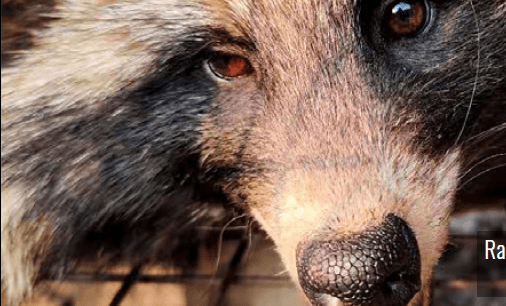 Wild animals sometimes found on
the menu in Asian countries harbor
a bewildering panoply of viruses, a
new study has found —including many
that can infect humans. Although none
is closely related to the coronavirus
that touched off the COVID-19 pandemic,
the study sends a clear warning that
other viral threats are lurking in the
animal kingdom, scientists say.
Live-animal markets are known to
have sparked outbreaks, such as severe
acute respiratory syndrome (SARS) 2
decades ago. But the study underscores
the extent of the threat, showing
“there is an enormous amount
of unsampled viral diversity” in the
animals, says Harvard University
evolutionary biologist William Hanage,
who was not involved in the work. “We
humans need to understand that for a
virus, different mammal species can
look pretty alike, provided their cells
have appropriate receptors.” China has
clamped down on the sale of the animals
sampled in the study, but other
countries in the region have not.
The researchers, led by veterinarian
Su Shuo of Nanjing Agricultural
University, took samples from nearly
2000 animals in China including fur
farms, zoos, and natural habitats. Most
were species that are traditionally eaten
as delicacies in China, including civets,
raccoon dogs, badgers, bamboo rats,
and porcupines. Using a “metagenomics”
...
Read full text
Wild animals sometimes found on
the menu in Asian countries harbor
a bewildering panoply of viruses, a
new study has found —including many
that can infect humans. Although none
is closely related to the coronavirus
that touched off the COVID-19 pandemic,
the study sends a clear warning that
other viral threats are lurking in the
animal kingdom, scientists say.
Live-animal markets are known to
have sparked outbreaks, such as severe
acute respiratory syndrome (SARS) 2
decades ago. But the study underscores
the extent of the threat, showing
“there is an enormous amount
of unsampled viral diversity” in the
animals, says Harvard University
evolutionary biologist William Hanage,
who was not involved in the work. “We
humans need to understand that for a
virus, different mammal species can
look pretty alike, provided their cells
have appropriate receptors.” China has
clamped down on the sale of the animals
sampled in the study, but other
countries in the region have not.
The researchers, led by veterinarian
Su Shuo of Nanjing Agricultural
University, took samples from nearly
2000 animals in China including fur
farms, zoos, and natural habitats. Most
were species that are traditionally eaten
as delicacies in China, including civets,
raccoon dogs, badgers, bamboo rats,
and porcupines. Using a “metagenomics”
...
Read full text
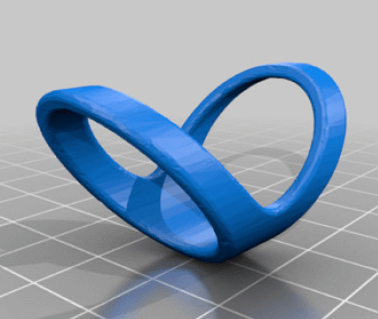 Swan style finger splint I customized
for a friend who has arthritis loses
finger splints which are a pain to replace.
I took the designs uploaded from
@orange_pla_ftw and printed them,
but they were too short in length, and
when lengthened they didn’t fit the
target fingers comfortably. A slight taper
was added and they fit well. I used
tinkercad to do my tinkering.
Sharing in case people find them
useful. I am printing using an Anycubic
Photon Mono, and the best fit I have
found is at ~110% of this model size.
Printed using rafts and supports, and
a quick sand with 400 grit wet and dry
sandpaper. Given how little resin is used
printing these, I would suggest printing
a range of sizes and doing test fits. ...
Note: Thingiverse is a website dedicated to the sharing of usercreated
digital design files. Providing primarily free, open-source
hardware designs licensed under the GNU General Public License or
Creative Commons licenses, the site allows contributors to select a
user license type for the designs that they share.
Read full text:
Swan style finger splint I customized
for a friend who has arthritis loses
finger splints which are a pain to replace.
I took the designs uploaded from
@orange_pla_ftw and printed them,
but they were too short in length, and
when lengthened they didn’t fit the
target fingers comfortably. A slight taper
was added and they fit well. I used
tinkercad to do my tinkering.
Sharing in case people find them
useful. I am printing using an Anycubic
Photon Mono, and the best fit I have
found is at ~110% of this model size.
Printed using rafts and supports, and
a quick sand with 400 grit wet and dry
sandpaper. Given how little resin is used
printing these, I would suggest printing
a range of sizes and doing test fits. ...
Note: Thingiverse is a website dedicated to the sharing of usercreated
digital design files. Providing primarily free, open-source
hardware designs licensed under the GNU General Public License or
Creative Commons licenses, the site allows contributors to select a
user license type for the designs that they share.
Read full text:
 Born in 1985 in Hong Kong, she
moved to the UK at the age of 11.
Graduated at Chelsea College of Art, Leese focused on fashion photography,
training at London College of Fashion.
Alexandra Leese only recently
decided to concentrate her works on
her own identity and reshaping the
female narrative as a woman herself.
Leese’s subjects may seem soft and
discreet, but they can quickly envelop
the viewer. Alex’ first zine Boys of Hong
Kong focuses on the new generation of
male Hongkongers; by means of these
photos, she aims to free firstly and
foremost her subjects from the western
stereotypes involving Asian men. ...
Read full text
Born in 1985 in Hong Kong, she
moved to the UK at the age of 11.
Graduated at Chelsea College of Art, Leese focused on fashion photography,
training at London College of Fashion.
Alexandra Leese only recently
decided to concentrate her works on
her own identity and reshaping the
female narrative as a woman herself.
Leese’s subjects may seem soft and
discreet, but they can quickly envelop
the viewer. Alex’ first zine Boys of Hong
Kong focuses on the new generation of
male Hongkongers; by means of these
photos, she aims to free firstly and
foremost her subjects from the western
stereotypes involving Asian men. ...
Read full text
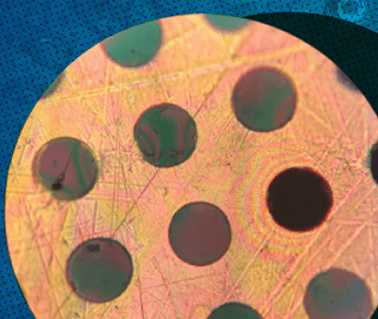 Massachusetts Institute of Technology
(MIT) chemical engineers
have invented a new type of plastic that
is twice as strong as steel and could
one day be used as a building material.
Dubbed 2DPA-1, the material is
light and mouldable like plastic but
has a strength and resistance that the
researchers behind the project liken to
steel and bulletproof glass. The MIT engineers
envision 2DPA-1 being used in
the near future as a coating to enhance
the durability of objects, and eventually
as a structural material.
“We don’t usually think of plastics as
being something that you could use to
support a building, but with this material,
you can enable new things,” said
MIT chemical engineering professor
Michael Strano. ...
Read full text
Massachusetts Institute of Technology
(MIT) chemical engineers
have invented a new type of plastic that
is twice as strong as steel and could
one day be used as a building material.
Dubbed 2DPA-1, the material is
light and mouldable like plastic but
has a strength and resistance that the
researchers behind the project liken to
steel and bulletproof glass. The MIT engineers
envision 2DPA-1 being used in
the near future as a coating to enhance
the durability of objects, and eventually
as a structural material.
“We don’t usually think of plastics as
being something that you could use to
support a building, but with this material,
you can enable new things,” said
MIT chemical engineering professor
Michael Strano. ...
Read full text
 Like many people I know, I always
pee right before I leave the house.
This has been a non-negotiable habit. ...
However, while the “just in case” pee
seems like a smart strategy, it might
actually be pretty bad for your bladder.
At least, that’s according to a recent
viral TikTok video from Bethany Henry
Clark, PT, DPT. In the video, she says
that making yourself pee when you
don’t feel the immediate need to do so
can, over time, actually make you have
to pee more and more often.
I got in touch with board-certified
urologist Lamia Gabal, MD, to get her
thoughts on “just in case” peeing.
First off, a normal bladder capacity
is about 10-15 ounces, Dr. Gabal says.
... In general, it’s normal to pee six to
eight times in a 24-hour period if you
drink 64 ounces of fluid a day, but this
depends on how much you drink.
Dr. Gabal says that e the “just in
case” pee strategy can be helpful for
people with urinary incontinence issues,
she says, because they will leak less.
But for otherwise healthy adults, Dr.
Gabal agrees with Clark that this practice
can be potentially problematic. “It
can send a message to your brain that
this is a correct volume for your bladder
to have the sensation of needing to
urinate, almost training your bladder to
have to void at smaller volumes,” she
says. ...
Read full text:
Like many people I know, I always
pee right before I leave the house.
This has been a non-negotiable habit. ...
However, while the “just in case” pee
seems like a smart strategy, it might
actually be pretty bad for your bladder.
At least, that’s according to a recent
viral TikTok video from Bethany Henry
Clark, PT, DPT. In the video, she says
that making yourself pee when you
don’t feel the immediate need to do so
can, over time, actually make you have
to pee more and more often.
I got in touch with board-certified
urologist Lamia Gabal, MD, to get her
thoughts on “just in case” peeing.
First off, a normal bladder capacity
is about 10-15 ounces, Dr. Gabal says.
... In general, it’s normal to pee six to
eight times in a 24-hour period if you
drink 64 ounces of fluid a day, but this
depends on how much you drink.
Dr. Gabal says that e the “just in
case” pee strategy can be helpful for
people with urinary incontinence issues,
she says, because they will leak less.
But for otherwise healthy adults, Dr.
Gabal agrees with Clark that this practice
can be potentially problematic. “It
can send a message to your brain that
this is a correct volume for your bladder
to have the sensation of needing to
urinate, almost training your bladder to
have to void at smaller volumes,” she
says. ...
Read full text:
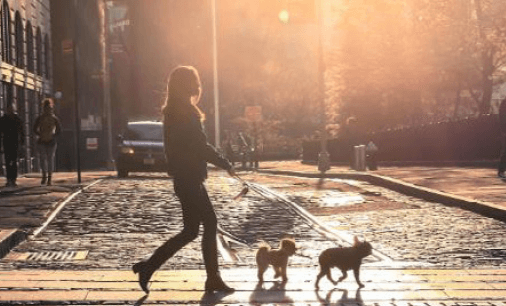 Spreading kindness not only helps
others feel better about themselves
—it can also boost the giver’s health
and happiness, according to research.
It’s a win-win for all. Here’s why.
Putting the well-being of others
before our own without expecting
anything in return —being altruistic—
stimulates the reward centers of the
brain, studies show. Those feel-good
chemicals flood our system, producing
a sort of “helper’s high.” Volunteering,
for example, has been shown to minimize
stress and improve depression.
The same activity can also reduce
the risk for cognitive impairment and
even help us live longer. Kindness
contributes to our sense of community
and belonging. And that is a key contributor to a healthy, longer life.
Lower blood pressure. Prosocial
spending (giving donations) has been
shown to reduce blood pressure and
improve heart health. Pain reduction.
A recent study found that regions of
the brain that react to painful stimulation
appear to be instantly deactivated
by the experience of giving. Happiness.
In the UK, researchers found that being
kind could boost happiness in as little
as three days.
Kindness suggestions. While driving,
make room for the car that wants to
enter your lane • Give a genuine compliment
to a family member, friend or colleague,
walk a neighbor’ dog as often ...
Read full text:
Spreading kindness not only helps
others feel better about themselves
—it can also boost the giver’s health
and happiness, according to research.
It’s a win-win for all. Here’s why.
Putting the well-being of others
before our own without expecting
anything in return —being altruistic—
stimulates the reward centers of the
brain, studies show. Those feel-good
chemicals flood our system, producing
a sort of “helper’s high.” Volunteering,
for example, has been shown to minimize
stress and improve depression.
The same activity can also reduce
the risk for cognitive impairment and
even help us live longer. Kindness
contributes to our sense of community
and belonging. And that is a key contributor to a healthy, longer life.
Lower blood pressure. Prosocial
spending (giving donations) has been
shown to reduce blood pressure and
improve heart health. Pain reduction.
A recent study found that regions of
the brain that react to painful stimulation
appear to be instantly deactivated
by the experience of giving. Happiness.
In the UK, researchers found that being
kind could boost happiness in as little
as three days.
Kindness suggestions. While driving,
make room for the car that wants to
enter your lane • Give a genuine compliment
to a family member, friend or colleague,
walk a neighbor’ dog as often ...
Read full text:
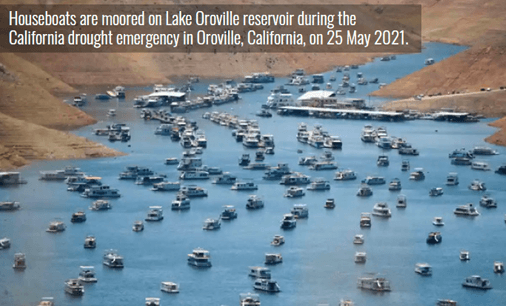 The American west has spent the
last two decades in what scientists
are now saying is the most extreme
megadrought in at least 1,200 years.
In a new study, researchers also noted
that human-caused climate change is
a significant driver of the destructive
conditions and offered a grim prognosis:
even drier decades lie ahead.
“Anyone who has been paying attention
knows that the west has been dry
for most of the last couple decades,”
says Park Williams, a climate scientist
at the University of California, Los Angeles
and the study’s lead author. “We
now know from these studies that is
dry not only from the context of recent
memory but in the context of the last
millennium.” Turning up the temperature
—the result of human caused
warming— has played a big part. Other
studies show how the climate crisis
“will increasingly enhance the odds of
long, widespread and severe megadroughts”,
the researchers write. Noting
that as the west is now in the midst
of the driest 22-year period in knowable
history, “this worst-case scenario
already appears to be coming to pass”.
The research builds on conclusions
from a previous study, also led by Williams,
that ranked the period between
2000 and 2018 as the second driest in
12 centuries. The last two incredibly
dry years —marked by record-setting
heatwaves, receding reservoirs, and a
rise in dangerously erratic blazes that
burned both uncontrollably and ...
The American west has spent the
last two decades in what scientists
are now saying is the most extreme
megadrought in at least 1,200 years.
In a new study, researchers also noted
that human-caused climate change is
a significant driver of the destructive
conditions and offered a grim prognosis:
even drier decades lie ahead.
“Anyone who has been paying attention
knows that the west has been dry
for most of the last couple decades,”
says Park Williams, a climate scientist
at the University of California, Los Angeles
and the study’s lead author. “We
now know from these studies that is
dry not only from the context of recent
memory but in the context of the last
millennium.” Turning up the temperature
—the result of human caused
warming— has played a big part. Other
studies show how the climate crisis
“will increasingly enhance the odds of
long, widespread and severe megadroughts”,
the researchers write. Noting
that as the west is now in the midst
of the driest 22-year period in knowable
history, “this worst-case scenario
already appears to be coming to pass”.
The research builds on conclusions
from a previous study, also led by Williams,
that ranked the period between
2000 and 2018 as the second driest in
12 centuries. The last two incredibly
dry years —marked by record-setting
heatwaves, receding reservoirs, and a
rise in dangerously erratic blazes that
burned both uncontrollably and ...
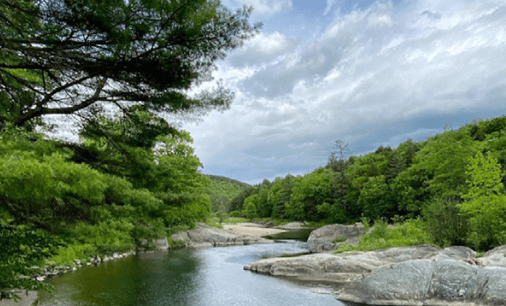 In 1981, Coevolution Quarterly published
a 20 question quiz written by
Charles, Dodge, Milliman, and Stockley
that is designed to reveal how well you
know your local natural environment.
Here are the questions: 1. Trace the
water you drink from precipitation to
tap. 2. How many days til the moon is
full? 3. What soil series are you standing
on? 4. What was the total rainfall in
your area last year? 5. When was the last
time a fire burned in your area? 6. What
were the primary subsistence techniques
of the culture that lived in your area
before you? 7. Name 5 edible plants in
your region and their season(s) of availability.
8. From what direction do winter
storms generally come in your region?
9. Where does your garbage go? 10. How long is the growing season where you
live? 11. On what day of the year are the
shadows the shortest where you live?
12. When do the deer rut in your region,
and when are the young born? 13. Name
five grasses in your area. Are any of
them native? 14. Name five resident and
five migratory birds in your area. 15.
What is the land use history of where
you live? 16. What primary ecological
event/process influenced the land form
where you live? 17. What species have
become extinct in your area? 18. What
are the major plant associations in your
region? 19. From where you’re reading
this, point north. 20. What spring wildflower
is consistently among the first to
bloom where you live? ...
Read full text:
In 1981, Coevolution Quarterly published
a 20 question quiz written by
Charles, Dodge, Milliman, and Stockley
that is designed to reveal how well you
know your local natural environment.
Here are the questions: 1. Trace the
water you drink from precipitation to
tap. 2. How many days til the moon is
full? 3. What soil series are you standing
on? 4. What was the total rainfall in
your area last year? 5. When was the last
time a fire burned in your area? 6. What
were the primary subsistence techniques
of the culture that lived in your area
before you? 7. Name 5 edible plants in
your region and their season(s) of availability.
8. From what direction do winter
storms generally come in your region?
9. Where does your garbage go? 10. How long is the growing season where you
live? 11. On what day of the year are the
shadows the shortest where you live?
12. When do the deer rut in your region,
and when are the young born? 13. Name
five grasses in your area. Are any of
them native? 14. Name five resident and
five migratory birds in your area. 15.
What is the land use history of where
you live? 16. What primary ecological
event/process influenced the land form
where you live? 17. What species have
become extinct in your area? 18. What
are the major plant associations in your
region? 19. From where you’re reading
this, point north. 20. What spring wildflower
is consistently among the first to
bloom where you live? ...
Read full text:
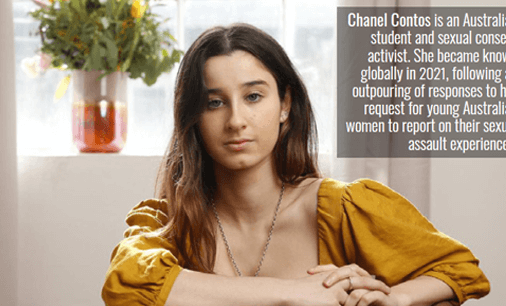 If ever there was cause for a cultural
reckoning, the Hurt Locker of female
student trauma compiled by Chanel Contos
is it. It is Exhibit A in our collective
failure to cultivate the social conditions
conducive to the flourishing of healthy
young human beings. The horror archive
now contains more than 5,000 accounts
of sexual assault, unwanted sex, and
coercion shared by female students and
former students in response to a question
posed by the 23-year-old former Kambala
student on Instagram. ... Every day
more girls come forward to add to the
trauma tome, offering their testimony
of being violated by teenage boys. Some
of the girls are as young as thirteen or
fourteen years of age. ...
Chanel Contos is now calling for better
sexual consent education. I support her aims ... But with every school workshop
I run, I see that ... Consent education
won’t be effective if women are not first
seen as human and worthy of dignity
and respect. ... I have sometimes heard
it said that the boys didn’t know what
they were doing. That they needed to
be taught more about consent, or that,
in the heat of the moment, they simply
misunderstood the girl’s wishes. But
surely we can all agree that if a boy
rapes a girl while she is asleep, there
was no attempt to gain consent. If a boy
sexually assaults a girl while his friends
film it and they then share the footage,
there was no intention to gain consent.
In both instances, sexual gratification
triumphs over empathy. ...
If ever there was cause for a cultural
reckoning, the Hurt Locker of female
student trauma compiled by Chanel Contos
is it. It is Exhibit A in our collective
failure to cultivate the social conditions
conducive to the flourishing of healthy
young human beings. The horror archive
now contains more than 5,000 accounts
of sexual assault, unwanted sex, and
coercion shared by female students and
former students in response to a question
posed by the 23-year-old former Kambala
student on Instagram. ... Every day
more girls come forward to add to the
trauma tome, offering their testimony
of being violated by teenage boys. Some
of the girls are as young as thirteen or
fourteen years of age. ...
Chanel Contos is now calling for better
sexual consent education. I support her aims ... But with every school workshop
I run, I see that ... Consent education
won’t be effective if women are not first
seen as human and worthy of dignity
and respect. ... I have sometimes heard
it said that the boys didn’t know what
they were doing. That they needed to
be taught more about consent, or that,
in the heat of the moment, they simply
misunderstood the girl’s wishes. But
surely we can all agree that if a boy
rapes a girl while she is asleep, there
was no attempt to gain consent. If a boy
sexually assaults a girl while his friends
film it and they then share the footage,
there was no intention to gain consent.
In both instances, sexual gratification
triumphs over empathy. ...
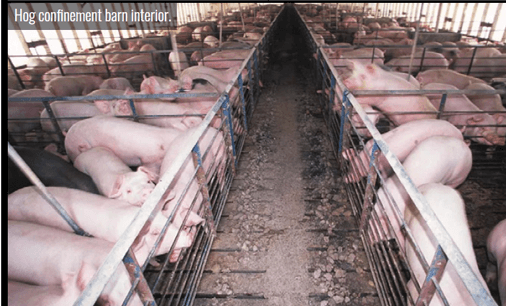 Someone has finally written a biography
on the real father of the animal
liberation movement —Ronnie Lee.
Lee’s lifelong work for animals spans
five decades and counting. During this
time, he has been involved in just about
every form of animal advocacy imaginable
—direct action, grassroots vegan
outreach, political campaigning, public
interest campaigns, and animal fostering,
to name a few. Perhaps best known
for founding the Animal Liberation Front
(ALF) and being jailed numerous times
for illegal direct actions, Ronnie Lee now
focuses exclusively on above-ground
animal advocacy, having retired from his
earlier, extensive underground career. ...
Lee’s moment seems to have been a
confluence of events —no single one having been definitive. ... Lee’s involvement
with the Hunt Saboteurs Association
(HSA) began to blossom into more
pointed forms of direct action as time
went on. In an effort to refine the efficacy
of his hunt sabbing efforts, Lee
became more and more motivated to
declare full scale war on all animal
exploiters. ...
Editor’s note: We stand against factory
farming, vivisection, and other forms of
animal testing and abuse. As an organization,
however, we do not advocate veganism
—and in fact, DGR co-founder Lierre
Keith wrote a book called The Vegetarian
Myth arguing that vegetarianism and
veganism are not a political or ecological
solution. ...
Someone has finally written a biography
on the real father of the animal
liberation movement —Ronnie Lee.
Lee’s lifelong work for animals spans
five decades and counting. During this
time, he has been involved in just about
every form of animal advocacy imaginable
—direct action, grassroots vegan
outreach, political campaigning, public
interest campaigns, and animal fostering,
to name a few. Perhaps best known
for founding the Animal Liberation Front
(ALF) and being jailed numerous times
for illegal direct actions, Ronnie Lee now
focuses exclusively on above-ground
animal advocacy, having retired from his
earlier, extensive underground career. ...
Lee’s moment seems to have been a
confluence of events —no single one having been definitive. ... Lee’s involvement
with the Hunt Saboteurs Association
(HSA) began to blossom into more
pointed forms of direct action as time
went on. In an effort to refine the efficacy
of his hunt sabbing efforts, Lee
became more and more motivated to
declare full scale war on all animal
exploiters. ...
Editor’s note: We stand against factory
farming, vivisection, and other forms of
animal testing and abuse. As an organization,
however, we do not advocate veganism
—and in fact, DGR co-founder Lierre
Keith wrote a book called The Vegetarian
Myth arguing that vegetarianism and
veganism are not a political or ecological
solution. ...

 Handmade, in a lovely watercolor
inspired design.
www.theapollobox.com
Handmade, in a lovely watercolor
inspired design.
www.theapollobox.com
 Bluetooth Earbuds
—with sound developed
by Teenage Engineering—
boast a powerful
11.6mm speaker driver,
Active Noise Cancellation,
touch-control gestures
and up to 34 hours of
listening per charge. The
ultra-lightweight design
features transparent
veneers to highlight the
craftsmanship underneath.
The earbuds can be
wirelessly charged on the
go with the case, which
can be charged via USB-C
cable (included).
Bluetooth Earbuds
—with sound developed
by Teenage Engineering—
boast a powerful
11.6mm speaker driver,
Active Noise Cancellation,
touch-control gestures
and up to 34 hours of
listening per charge. The
ultra-lightweight design
features transparent
veneers to highlight the
craftsmanship underneath.
The earbuds can be
wirelessly charged on the
go with the case, which
can be charged via USB-C
cable (included).
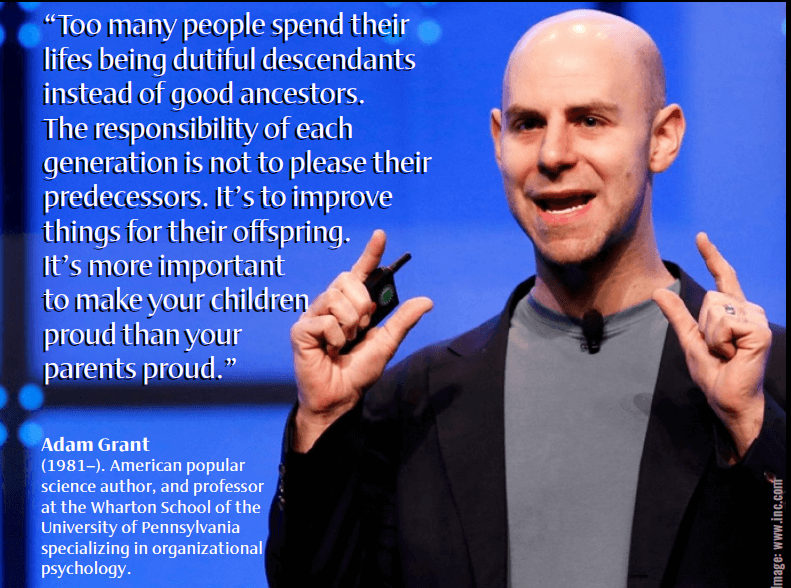 “Too many people spend their
lifes being dutiful descendants
instead of good ancestors.
The responsibility of each
generation is not to please their
predecessors. It’s to improve
things for their offspring.
It’s more important
to make your children
proud than your
parents proud.”
Adam Grant
(1981–).
“Too many people spend their
lifes being dutiful descendants
instead of good ancestors.
The responsibility of each
generation is not to please their
predecessors. It’s to improve
things for their offspring.
It’s more important
to make your children
proud than your
parents proud.”
Adam Grant
(1981–).
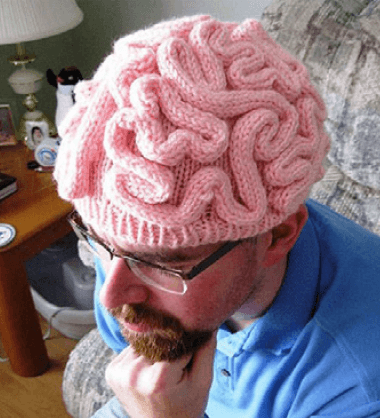 A simple way to express yourself.
Knitted in cotton with 8 color options.
www.theapollobox.com
A simple way to express yourself.
Knitted in cotton with 8 color options.
www.theapollobox.com
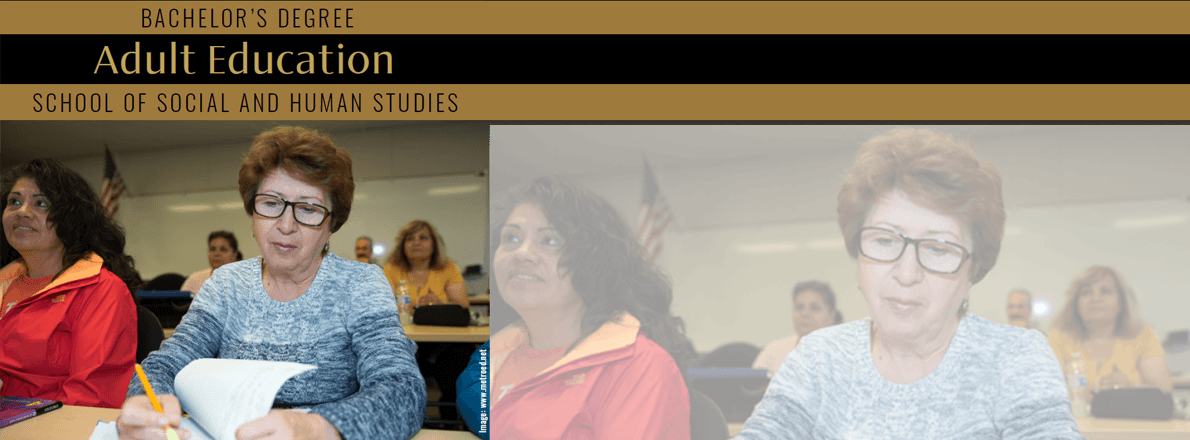 The Bachelor of Adult Education
(BA) program objective is to provide
students with technical training
necessary to work in the broad field
of adult education; including community
development, training coordination,
mentorship, staff development,
corporate and career training. Courses
focus on training fundamentals,
educational psychology, and adult
learning behavior. The Bachelor of
Adult Education (BA) program is offered
online via distance learning.
After evaluating both academic record
and life experience, AIU staff working
in conjunction with Faculty and
Academic Advisors will assist students
in setting up a custom-made
program, designed on an individual
basis. This flexibility to meet student
needs is seldom found in other distance
learning programs. Our online
program does not require all students
to take the same subjects/courses, use
the same books, or learning materials.
Instead, the online Bachelor of
Adult Education (BA) curriculum is
designed individually by the student
and academic advisor.
It specifically addresses strengths
and weaknesses with respect to
market opportunities in the student’s
major and intended field of work.
Understanding that industry and geographic
factors should influence the
content of the curriculum instead of
a standardized one-fits-all design is
the hallmark of AIU’s unique approach
to adult education. This philosophy
addresses the dynamic and constantly
changing environment of working
professionals by helping adult students
in reaching their professional
and personal goals within the scope of
the degree program.
The Bachelor of Adult Education
(BA) program objective is to provide
students with technical training
necessary to work in the broad field
of adult education; including community
development, training coordination,
mentorship, staff development,
corporate and career training. Courses
focus on training fundamentals,
educational psychology, and adult
learning behavior. The Bachelor of
Adult Education (BA) program is offered
online via distance learning.
After evaluating both academic record
and life experience, AIU staff working
in conjunction with Faculty and
Academic Advisors will assist students
in setting up a custom-made
program, designed on an individual
basis. This flexibility to meet student
needs is seldom found in other distance
learning programs. Our online
program does not require all students
to take the same subjects/courses, use
the same books, or learning materials.
Instead, the online Bachelor of
Adult Education (BA) curriculum is
designed individually by the student
and academic advisor.
It specifically addresses strengths
and weaknesses with respect to
market opportunities in the student’s
major and intended field of work.
Understanding that industry and geographic
factors should influence the
content of the curriculum instead of
a standardized one-fits-all design is
the hallmark of AIU’s unique approach
to adult education. This philosophy
addresses the dynamic and constantly
changing environment of working
professionals by helping adult students
in reaching their professional
and personal goals within the scope of
the degree program.
 Atlantic International University is accredited by the Accreditation Service for International
Schools, Colleges and Universities (ASIC). ASIC Accreditation is an internationally
renowned quality standard for colleges and universities. Visit ASIC’s Directory of Accredited
Colleges and Universities. ASIC is a member of CHEA International Quality Group
(CIQG) in the USA, an approved accreditation body by the Ministerial Department of the Home Office
in the UK, and is listed in the International Directory of the Council for Higher Education Accreditation
(CHEA). The University is based in the United States and was established by corporate charter in 1998.
Atlantic International University is accredited by the Accreditation Service for International
Schools, Colleges and Universities (ASIC). ASIC Accreditation is an internationally
renowned quality standard for colleges and universities. Visit ASIC’s Directory of Accredited
Colleges and Universities. ASIC is a member of CHEA International Quality Group
(CIQG) in the USA, an approved accreditation body by the Ministerial Department of the Home Office
in the UK, and is listed in the International Directory of the Council for Higher Education Accreditation
(CHEA). The University is based in the United States and was established by corporate charter in 1998.
 In some cases, accredited colleges
may not accept for transfer courses and degrees
completed at unaccredited colleges, and some
employers may require an accredited degree as
a basis for eligibility for employment. Potential
students should consider how the above may affect
their interests, AIU respects the unique rules and
regulations of each country and does not seek to
influence the respective authorities. In the event
that a prospective student wishes to carry out any
government review or process in regards to his
university degree, we recommend that the requirements
of such are explored in detail with the relevant
authorities by the prospective student as the
university does not intervene in such processes.
AIU students can be found in over 180 countries,
they actively participate and volunteer
in their communities as part of their academic
program and have allocated thousands of service
hours to diverse causes and initiatives. AIU
programs follow the standards commonly used by
colleges and universities in the United States with
regards to the following: academic program
structure, degree issued, transcript, and
other graduation documents.
AIU graduation documents can include
an apostille and authentication from the
US Department of State to facilitate their
use internationally.
In some cases, accredited colleges
may not accept for transfer courses and degrees
completed at unaccredited colleges, and some
employers may require an accredited degree as
a basis for eligibility for employment. Potential
students should consider how the above may affect
their interests, AIU respects the unique rules and
regulations of each country and does not seek to
influence the respective authorities. In the event
that a prospective student wishes to carry out any
government review or process in regards to his
university degree, we recommend that the requirements
of such are explored in detail with the relevant
authorities by the prospective student as the
university does not intervene in such processes.
AIU students can be found in over 180 countries,
they actively participate and volunteer
in their communities as part of their academic
program and have allocated thousands of service
hours to diverse causes and initiatives. AIU
programs follow the standards commonly used by
colleges and universities in the United States with
regards to the following: academic program
structure, degree issued, transcript, and
other graduation documents.
AIU graduation documents can include
an apostille and authentication from the
US Department of State to facilitate their
use internationally.
| Dr. Franklin Valcin President/Academic Dean |
Dr. José Mercado Chief Executive Officer Chairman of the Board of Trustees |
Ricardo González, PhD Provost |
| Dr. Ricardo Gonzalez Chief Operation Officer and MKT Director |
Linda Collazo Logistics Coordinator |
Dr. Silvia Restorff Academic Advisor |
| Dr. Miriam Garibaldi Viceprovost for Research |
Irina Ivashuk Alumni Association Coordinator |
Dr. Prakash Menon Academic Advisor |
| Dr. Ofelia Miller Director of AIU |
Clara Margalef Director of Special Projects of AIU |
Carlos Aponte Telecommunications Coordinator |
| Juan Pablo Moreno Director of Operations |
David Jung Corporate/Legal Counsel |
Dr. Nilani Ljunggren De Silva Academic Advisor |
| Paula Viera Director of Intelligence Systems |
Bruce Kim Advisor/Consultant |
Dr. Scott Wilson Academic Advisor |
| Felipe Gomez Design Director / IT Supervisor |
Thomas Kim Corporate/ Accounting Counsel |
Dr. Mohammad Shaidul Islam Academic Advisor |
| Daritza Ysla IT Coordinator |
Camila Correa Quality Assurance Coordinator |
Dr. Edgar Colon Academic Advisor |
| Nadeem Awan Chief Programming Officer |
Maricela Esparza Administrative Coordinator |
Deborah Rodriguez Academic Tutor Coordinator |
| Dr. Jack Rosenzweig Dean of Academic Affairs |
Chris Benjamin IT and Hosting Support |
Cyndy Dominguez Academic Tutor Coordinator |
| Dr. Edward Lambert Academic Director |
Mayra Bolivar Accounting Coordinator |
Kinmberly Diaz Admissions Support Tutor |
| Dr. Ariadna Romero Advisor Coordinator |
Roberto Aldrett Communications Coordinator |
Amalia Aldrett Admissions Coordinator |
| Nadia Gabaldon Academic Coordinator |
Giovanni Castillo IT Support |
Sandra Garcia Admissions Coordinator |
| Jhanzaib Awan Senior Programmer |
Jaime Rotlewicz Dean of Admissions |
Jose Neuhaus Admissions Support |
| Leonardo Salas Human Resource Manager |
Dr. Mario Rios Academic Advisor |
Junko Shimizu Admissions Coordinator |
| Benjamin Joseph IT and Technology Support |
Michael Phillips Registrar’s Office |
Veronica Amuz Admissions Coordinator |
| Rosie Perez Finance Coordinator |
Rene Cordon Admissions Support |
Alba Ochoa Admissions Coordinator |
| Chris Soto Admissions Counselor |
Jenis Garcia Admissions Counselor |
|
 The School of Business and Economics
allows aspiring and practicing
professionals, managers, and entrepreneurs
in the private and public sectors
to complete a self paced distance
learning degree program of the highest
academic standard.
The ultimate goal is to empower
learners and help them take advantage
of the enormous array of resources
from the world environment in order
to eliminate the current continuum of
poverty and limitations.
Degree programs are designed for
those students whose professional experience has been in business,
marketing, administration, economics,
finance and management.
The School of Business and Economics
allows aspiring and practicing
professionals, managers, and entrepreneurs
in the private and public sectors
to complete a self paced distance
learning degree program of the highest
academic standard.
The ultimate goal is to empower
learners and help them take advantage
of the enormous array of resources
from the world environment in order
to eliminate the current continuum of
poverty and limitations.
Degree programs are designed for
those students whose professional experience has been in business,
marketing, administration, economics,
finance and management.
 The School of Social and Human Studies
is focused on to the development of
studies which instill a core commitment
to building a society based on social and
economic justice and enhancing opportunities
for human well being.
The founding principles lie on the
basic right of education as outlined
in the Declaration of Human Rights.
We instill in our students a sense of
confidence and self reliance in their
ability to access the vast opportunities
available through information channels,
the world wide web, private, public,
nonprofit, and nongovernmental organizations in an ever expanding
global community.
Degree programs are aimed towards
those whose professional life has been
related to social and human behavior,
with the arts, or with cultural studies.
The School of Social and Human Studies
is focused on to the development of
studies which instill a core commitment
to building a society based on social and
economic justice and enhancing opportunities
for human well being.
The founding principles lie on the
basic right of education as outlined
in the Declaration of Human Rights.
We instill in our students a sense of
confidence and self reliance in their
ability to access the vast opportunities
available through information channels,
the world wide web, private, public,
nonprofit, and nongovernmental organizations in an ever expanding
global community.
Degree programs are aimed towards
those whose professional life has been
related to social and human behavior,
with the arts, or with cultural studies.
 The School of Science and Engineering
seeks to provide dynamic, integrated,
and challenging degree programs
designed for those whose experience
is in industrial research, scientific production,
engineering and the general
sciences. Our system for research and
education will keep us apace with the
twenty-first century reach scientific
advance in an environmentally and
ecologically responsible manner to allow
for the sustainability of the human
population. We will foster among our
students a demand for ethical behavior,
an appreciation for diversity, an understanding
of scientific investigation, knowledge of design innovation, a
critical appreciation for the importance
of technology and technological change
for the advancement of humanity.
The School of Science and Engineering
seeks to provide dynamic, integrated,
and challenging degree programs
designed for those whose experience
is in industrial research, scientific production,
engineering and the general
sciences. Our system for research and
education will keep us apace with the
twenty-first century reach scientific
advance in an environmentally and
ecologically responsible manner to allow
for the sustainability of the human
population. We will foster among our
students a demand for ethical behavior,
an appreciation for diversity, an understanding
of scientific investigation, knowledge of design innovation, a
critical appreciation for the importance
of technology and technological change
for the advancement of humanity.
 With access to a global catalog created and maintained collectively by more than
9,000 participating institutions, AIU students have secured excellent research
tools for their study programs.
With access to a global catalog created and maintained collectively by more than
9,000 participating institutions, AIU students have secured excellent research
tools for their study programs.